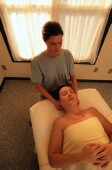- One in 8 U.S. Adults Have Now Used Blockbuster Meds Like Ozempic
- Pushing the Body in ‘Extreme’ Sports Won’t Shorten Life Span
- Utah Kids Got E. Coli From Playing Around Lawn Sprinklers
- Getting Help for Alcohol, Drug Abuse Tougher for Rural Americans
- Outdoor Workers Face Skin Cancer Danger
- The Pros & Cons of Robotic Knee Replacement Surgery
- Oral Rinse Might Alert Doctors to Stomach Cancers
- Telehealth Tougher When English Isn’t First Language
- More Than 200 Insulin Pump Users Injured After App Causes Malfunction
- Americans Got Drug-Resistant Infections After Stem Cell Treatments in Mexico
Timing Is Key to Massage’s Benefits for Neck Pain: Study


Massage can relieve neck pain if it’s done often by a professional therapist and for the correct length of time, according to new research.
One-hour sessions two or three times a week appear to be best, said study researcher Karen Sherman, senior scientific investigator at Group Health Research Institute in Seattle.
“In the short term, 60 minutes of massage is better than 30, and you want to do multiple treatments a week for the first four weeks,” she said.
Her study, which tested the effects of a month of massage, is published in the March/April issue of the Annals of Family Medicine.
Persistent neck pain is common and stems from numerous causes — car accidents, sleeping in awkward positions or spending hours hunched over a computer, among them, Sherman said.
Doctors often recommend anti-inflammatory medicines, but these drugs frequently don’t provide enough relief, she noted. “People with back and neck pain aren’t usually satisfied with what they get from their doctor, so they are looking around for something that works,” Sherman explained.
Previous studies of massage for neck pain have produced conflicting results, so Sherman’s team decided to look closer. Specifically, they wanted to determine what dose of massage is ideal. In a previous study, Sherman had found that benefits of massage were evident after four weeks.
For the new study, she randomly assigned 228 men and women, aged 20 to 64, to one of six groups. These included 30-minute massages two or three times weekly, one-hour massages one, two or three times weekly, and a comparison group receiving no massage.
Assessing neck functioning and pain levels a week after treatment ended, the researchers determined that patients getting one hour of massage three times a week showed the most gains after four weeks of massage.
Compared to those who got no massage, “people getting massage three times a week were almost five times as likely to have a clinically meaningful (meaning important or noticeable) improvement in function and over twice as likely to report a clinically meaningful decrease in pain,” Sherman said.
Many patients who get therapeutic massage for chronic neck pain may not reap benefits if they undergo shorter or less frequent sessions, the authors suggested.
Jeanette Ezzo, a massage therapist and researcher in Takoma Park, Md., called the study “an important contribution to understanding the massage dosage necessary to relieve neck pain.” Ezzo has published research on the effectiveness of complementary medicine practices, including massage.
Nationwide, the average cost for a one-hour massage by a professional massage therapist is $65, according to the American Massage Therapy Association. However, in large cities the fee can be much higher.
Insurance coverage varies, said Sherman. Whether massage therapy would work in elderly patients isn’t known as the average age of her patients was in the 40s.
Sherman cautioned against having a family member or friend attempt to massage away your neck pain. “We used extremely experienced massage therapists,” she said. Treatment sessions also assessed range of motion and looked at how the patient’s body compensated for the neck pain, which the average person is unable to do, she said.
Dr. Fredrick Wilson, a spine specialist at the Cleveland Clinic, stressed the need to use a professional massage therapist. “If done incorrectly, [massage] can actually cause muscle tightening and spasm,” he said.
For neck or back pain, “it seems the training and experience make a difference in the amount of pain relief patients get,” he added.
However, Wilson said he is waiting for a study that shows longer-lasting effects before he recommends massage for patients complaining of neck pain. The authors agreed that studies with longer follow-up are warranted.
People with chronic neck pain might also ask their doctor about special neck exercises, Sherman said.
Neck pain accounts for more than 10 million medical visits a year in the United States, according to background information in the study. When patients were followed up one to five years later, at least half reported persistent or recurrent problems, previous studies found.
More information
For more about massage’s effects on health, visit the American Massage Therapy Association.
Source: HealthDay
Copyright © 2024 HealthDay. All rights reserved.










